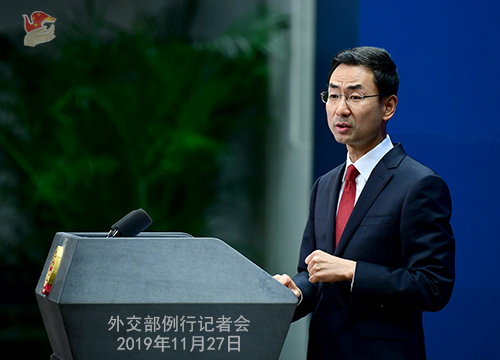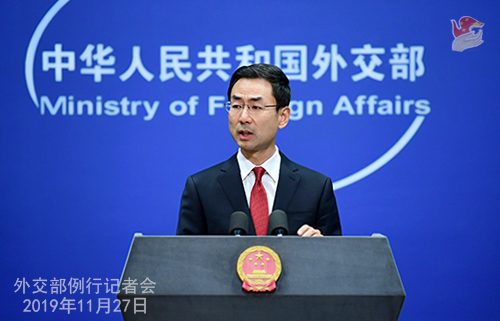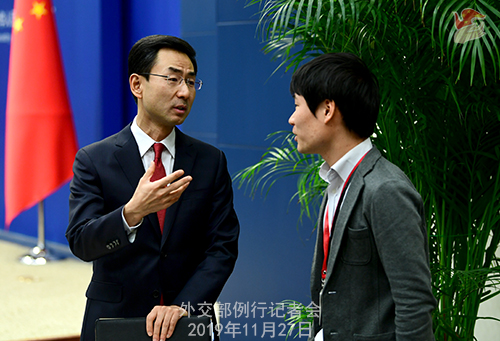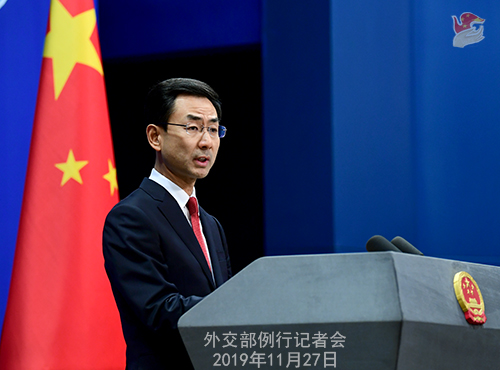| Foreign Ministry Spokesperson Geng Shuang's Regular Press Conference on November 27, 2019 |
| 2019-11-27 22:18 |
|
Q: An opposition Senator said that a Chinese state-owned company has a lot of stake in the Philippines' National Transmission Corporation (Transco). It makes China capable of controlling the Philippines' power grid, which is a threat to the country's national security. Do you have a comment? A: To my knowledge, the State Grid Corporation of China took part in the Transco project as a cooperation partner, providing safe, efficient and high-quality electricity services. The project is now operated, managed and maintained by the Philippine side, with the Chinese partner offering necessary technical support upon request. The allegation of China's control over the Philippines' power grid or threat to the country's national security is completely groundless. Besides, the Chinese business also actively fulfills its social responsibilities. The "Brighten Up" project that brings electricity to remote areas in the Philippines has been applauded by local authorities and people. The Philippines is China's close and friendly neighbor as well as an important partner. We support Chinese businesses' pursuit of practical, win-win cooperation in the Philippines in accordance with laws and regulations. We hope certain individuals in the Philippines will look at cooperation with China in an open, objective and impartial manner. There is no need to worry about the sky falling or imagine trouble where there is none. Q: US Secretary of State Pompeo said on November 26 that recent reports on Xinjiang show gross human rights violations there. It's not just Muslims but other minority groups that have also felt the repression. He called on the Chinese government to release all those who are arbitrarily detained. I wonder if you have any comment? A: Those remarks from the US side are once again full of political prejudice and lies, revealing for another time his double standards on counter-terrorism and de-radicalization as well as his malicious intention to interfere in China's internal affairs under the pretext of Xinjiang-related issues. Here are some points I'd like to emphasize. First, there are no so-called "issues" related to ethnicity, religion or human rights in Xinjiang. The local government's efforts are in fact on counter-terrorism and de-radicalization. From 1990 to 2016, thousands of violent and terrorist incidents occurred in Xinjiang, which caused heavy casualties and property losses. Under such circumstances, Xinjiang lawfully fought violent and terrorist crimes while addressing the root causes, and it hasn't seen a single violent, terrorist incident over the past three years. The region now enjoys stability, ethnic solidarity and its people live a happy life. Faced with such plain facts, do certain people still think residents in Xinjiang should reject our positive measures and live in the shadows of extremism, violence and terrorism instead? Second, the Chinese government protects the freedom of religious belief of all Chinese nationals, including Xinjiang Uyghurs and other ethnic minorities. There are nearly 200 million religious believers in China. Among them are more than 20 million Muslims and over 380 thousand clerics. There are approximately 5,500 religious groups and over 140,000 places of worship registered for religious activities. In Xinjiang, there are 24,400 mosques, which means there is a mosque for every 530 Muslims on average. Those are all facts that you can find in the seven white papers on Xinjiang published since 2015 by the Chinese government. Apparently what some people in the US lack is not means to get the correct information, but the courage and conscience to admit the truth. Third, China welcomes foreigners with an objective and fair mind to visit Xinjiang. Since the end of last year, thousands of foreign diplomats, international organization officials and media personnel have visited Xinjiang and seen with their own eyes the remarkable achievements in preventive counter-terrorism and de-radicalization. In the meantime I must emphasize that Xinjiang affairs are China's internal affairs that allow no foreign interference. Finally, we will continue to handle our domestic affairs well. We will continue to implement our Xinjiang policy and ensure the region's sound development. The most powerful response to slanders is Xinjiang's lasting prosperity, stability, ethnic solidarity and social harmony.
Q: A Japanese national was reportedly arrested by Chinese national security authority in July this year in Changsha. Can you confirm that? A: I'm not aware of the specifics of this case. I'd refer you to the competent authority if you are interested. In China, foreign citizens suspected of violating Chinese law are always handled according to law. We also provide necessary assistance to the Japanese side for fulfilling its consular duties according to the Agreement on Consular Relations between China and Japan. In the meantime, we hope Japan will remind its citizens to observe Chinese laws and regulations and do not conduct illegal activities in our territory. Follow-up: Which department is the competent authority you talked about? A: I referred to the department in charge of national security. I believe you know which department that is since you said earlier yourself that the Japanese was arrested by the national security authority.
Q: Reports on "Chinese interference" have recently triggered many discussions in Australia. Former Prime Minister Kevin Rudd said that Australian security officials' comments on "Chinese interference" are overreaction, and that checking against the threat of foreign interference should not result in anti-Chinese domestic political witch-hunt. I wonder if you have any comment on his remarks? A: We noted relevant reports. Certain Australian media and institutions have been creating and hyping up "Chinese espionage" and "Chinese infiltration" with all kinds of false exaggeration and bias. They have reached a state of hysteria and extreme nervousness. In light of that, it is even more important that people with vision can make statements that are objective and rational. I'd like to stress the following points. First, China pursues the Five Principles of Peaceful Coexistence when developing state-to-state relations. We do not interfere in other countries' internal affairs, and we believe all countries should independently choose their own development path based on domestic conditions. In this sense, China's practice is upright and aboveboard. No one can accuse us of any kind of "interference". In the meantime, China is committed to socialism with Chinese characteristics and opposed to foreign interference. We encourage all countries to openly make commitments that they will not interfere in other countries' domestic affairs under whatever circumstance or excuse. I wonder if Australia can actually make such commitment? Second, China opposes the behavior of certain Australian forces and people to smear China by rampantly hyping up "Chinese interference". They don't even have the readiness to know the facts or hear China's voice. What they are keen in is fabricating "evidence" that is ridiculously untrue and full of loopholes. Lies repeated a thousand times are still lies. They will only be tools used by anti-China forces. Third, out of political agenda and ideological prejudice, some people in Australia have politicized economic, trade, cultural, educational, science and technology ties between China and Australia. They maliciously misinterpret and smear the normal activities and sincere sentiments of overseas Chinese in Australia, including Chinese students, while wantonly oppressing them. This has undermined the momentum for China-Australia cooperation. It is against the current trend of the world as well as social justice, and it damages Australia's own image and interests. Fourth, we advise some Australian media to respect clear facts, have some basic professional ethics, reject ideological bias and refrain from doing anything irresponsible or absurd. We also hope the Australian government will heed the rational and objective voices, make clarifications on rumors at the earliest time possible, and make greater contributions to mutual trust and cooperation between China and Australia. Q: Recently a teenage girl uploaded a video onto Tiktok, the international version of Douyin, where she talked about the internment of Uighurs in Xinjiang. Her account was suspended but the video remains on the platform. Does China have any particular views on the fact that this video remains on the platform given that the country does not have a cyberspace administration to regulate the contents available on the Internet? A: I'm not aware of that. How can I know the details of a personal online account? I can only tell you that the Chinese government asks our companies to observe international rules as well as local laws and regulations when doing business overseas. We also hope other countries will provide them a fair, just and non-discriminatory business environment as we consistently stated.
Q: US Ambassador to Germany Grenell said in a statement on November 25 that "there is no moral equivalence between China and the US" and that equating the US government to the Communist Party of China is an insult to the US and Chinese citizens. Would you like to comment on this? A: Every once in a while some US politicians or officials would jump on stage with a clumsy show to discredit China, which only exposes their malicious calculations and political agenda. There indeed is no moral equivalence between China and the US. In the international community, China always upholds peace, development and justice while the self-centered US pursues selfish gains at the expense of others and walks away from commitments. Its motto seems to be that whoever stands with it shall prosper and whoever doesn't shall perish. First, China upholds world peace. Committed to peaceful development, China contributes wisdom and efforts to maintaining world peace and stability. By the end of last year, China has contributed nearly 40,000 UN peace-keeping personnel, outnumbering other permanent members of the Security Council. In international relations, committed to the principle of mutual respect and non-interference in others' internal affairs, we play a constructive role in facilitating the resolution through dialogue and consultation of hotspots like the Korean Peninsula issue, the Iranian nuclear issue, the Afghanistan issue and the Rakhine State issue. With constructive efforts, China has increasingly become a source of stability and confidence for world peace. What about the US? Well, it is a creator of unrest and turmoil. The warfare it started in Afghanistan, Iraq, Libya and Syria has left the people there with wounds that will never heal. Among its stark interference in other countries' internal affairs, the US pulled the strings for the "Arab Spring" in the Asian-African region, directed "color revolutions" in Eurasian countries, and hatched "peaceful evolutions" all over the world. It has become the world's top source of instability. How can there be any equivalence between such a country and China? Second, China contributes to global development. Through opening-up and win-win cooperation, we share opportunities brought by domestic development with the rest of the world. China is a staunch defender of the WTO-centered multilateral trading regime and is committed to building an open world economy. As the world's second largest economy, China has been contributing as much as 34% to world GDP growth for ten consecutive years. Over the past 70 years, we have provided nearly 400 billion yuan in assistance to 166 countries and international organizations and helped more than 120 developing countries to the best of our capabilities. The Belt and Road Initiative proposed six years ago has received the recognition and active participation of the international community. With fruitful early harvests, it has become the world's most popular public good and largest platform for economic cooperation. What about the US? It is a complete bully. Holding high the banner of "America first", it is only thinking about taking advantage of others. In trade with other countries, it raises tariffs whenever it pleases. In the international financial system, it abuses the monopoly status of the US dollar while imposing unilateral sanctions and long-arm jurisdiction at every turn. It even uses national power to oppress certain countries and businesses with trumped-up charges. While reluctant to invest in other countries, the US uses every means to sabotage their cooperation with China. How can there be any equivalence between such a country and China? Third, China upholds international order. We champion multilateralism, defend the UN-centered international system and the international order based on international law, and endeavor to build a community with a shared future for mankind. We have joined more than 100 inter-governmental international organizations and signed more than 500 multilateral treaties. China has made significant contributions to the conclusion and implementation of the Paris Agreement. We always submit our UN contributions on time and in full to support its role in promoting peace and development. We work actively towards the implementation of the UN 2030 Agenda for Sustainable Development. The G20 Hangzhou Summit adds development to the global macro policy coordination framework for the first time, a move applauded by developing countries. What about the US? It is a spoiler in global governance. From 2017, walking away from its responsibilities and obligations, the US withdrew from UNESCO, the UNHRC, the Paris Agreement, the JCPOA and the INF Treaty. The list goes on. Turning a blind eye to the prevalent and grave human rights violations at home, the US keeps criticizing other countries' human rights conditions, despite the fact that it is not party to important human rights instruments such as the Convention on the Rights of the Child and the Convention on the Elimination of all Forms of Discrimination Against Women. It sends warships to flex muscles at others' doorsteps in the name of freedom of navigation in the South China Sea despite the fact that it has not ratified the United Nations Conference on the Law of the Sea. It has long been stalling payment of UN contributions to the amount of 1.055 billion US dollars, putting the UN into a financial crisis. During this year's UNGA, it even openly boasted nationalism and denounced globalization. How can there be any equivalence between such a country and China? I need to point out that Mr. Grenell's attempt to drive a wedge between the Communist Party of China (CPC) and the Chinese people is deeply sinister. Since the People's Republic of China was founded 70 years ago, the CPC has led the Chinese people in making historic leaps from finding their feet to becoming prosperous and strong. The CPC has the full support of the Chinese people. According to US poll results, Chinese people's trust in their government ranks top in the world. People's endorsement speaks volumes. Failure is the only end for any political attempt to negate China's socialist system and drive a wedge between the CPC and the Chinese people. Lastly, here is my advice to Mr. Grenell and some other American politicians: know yourself. You really need to devote more efforts in solving America's problems at home and give up bias, stubbornness and anti-China gibberish. Like we always say, don't overestimate your rumors or underestimate others' judgment. Lies, though repeated a thousand times, are still lies.
|
|





